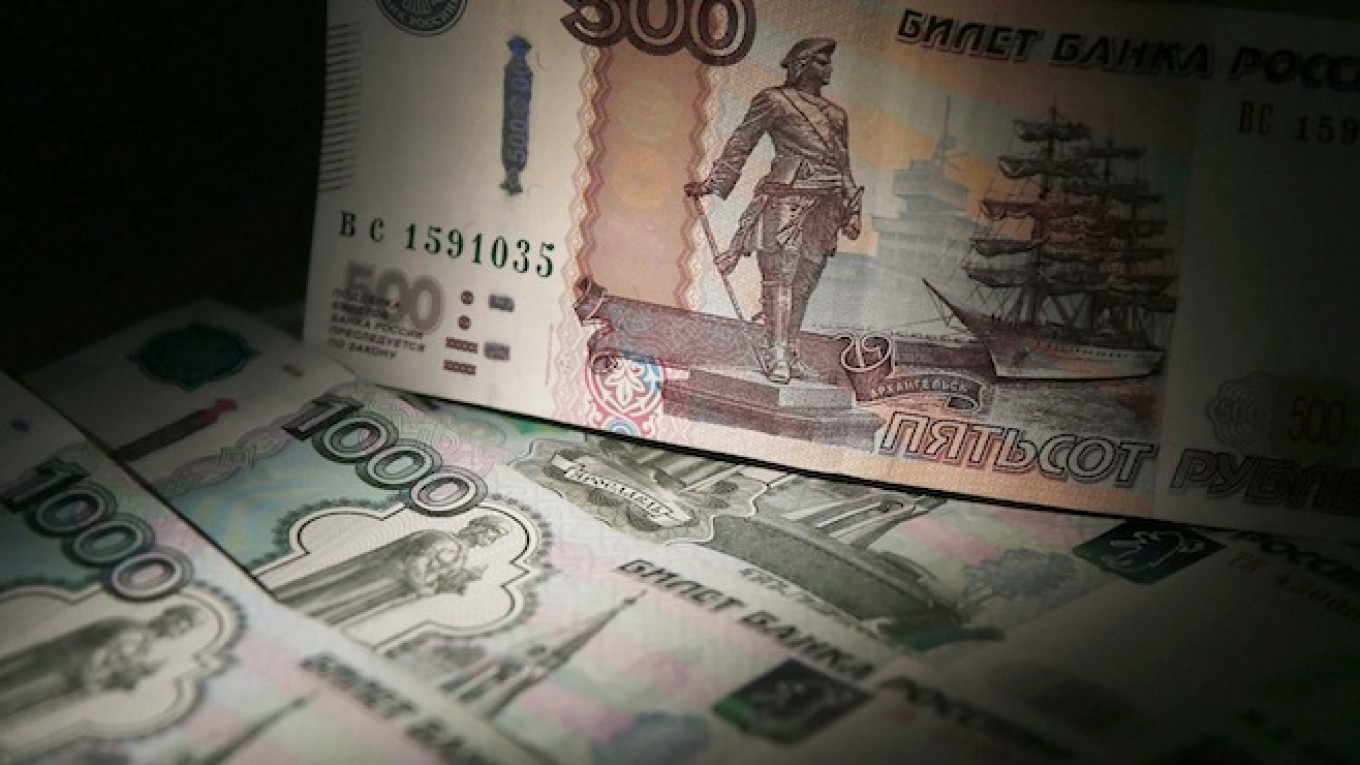Russian stocks fell on Wednesday and the ruble resumed its decline, a day after Russia and Ukraine failed to finalize a deal on gas supplies, and ahead of a sovereign rating review by Standard & Poor's on Friday.
The ruble's fall intensified sharply after oil giant Rosneft requested almost $50 billion in financial aid from the government, underscoring the scale of the financial difficulties imposed on Russia by Western sanctions over Ukraine.
Russian indexes had opened higher, reflecting reviving global risk appetite after Wall Street saw its largest one-day gain of the year on Tuesday. But the gains in Russia proved fleeting, with the indexes sinking into the red during the afternoon.
At market close, the dollar-denominated RTS index was down 1.54 percent at 1,047 points, while the ruble-based MICEX was 0.66 percent lower at 1,374 points.
Even a rise in oil prices, usually a key driver of Russian assets, failed to lift spirits. Brent was trading just under $87 a barrel, up from last week's multi-year low of $82.6.
"Investors are cautious even though oil prices have been rising quite substantially," said Timur Nigmatullin, an analyst at Investcafe.
He said Russian stocks were being weighed down by fears that other rating agencies could lower Russia's sovereign rating, following Moody's, which cut the rating last week. Standard & Poor's is due to review its rating on Friday.
"The probability of this event [an S&P downgrade] is not great, but this year investors have risked enough and in the last two months of the year they want to take a break from risks," Zerich Capital analyst Yelena Shishkina said in a note.
Disappointment over the failure to ink a gas agreement between Russia and Ukraine is also behind investor caution.
Talks in Brussels on Tuesday failed to finalize a deal aimed at settling a long-standing dispute over gas supplies, linked to wider tensions between Russia and the West over the Ukrainian political crisis. Talks resume next week.
Sanctions Risk
While Russia's energy minister said he was optimistic that a deal could soon be reached, Ukraine's prime minister said he was skeptical.
"Now there is high uncertainty over the solving of the so called gas problem," Nigmatullin said. "The results of these talks could significantly influence the geopolitical risks connected with Russia, in particular the tightening or easing of [Western] sanctions."
Shares in gas company Gazprom were down 0.9 percent in ruble terms, underperforming the market.
"Although Russia and Ukraine failed yesterday to reach an accord on gas supplies for the coming winter, significant progress was made, and details are likely to be worked out next week," Alfa Bank analysts said in a note.
Investors in Russia are also watching parliamentary elections in Ukraine on Sunday, where a strong showing by nationalist forces could undermine an already shaky cease-fire in the country's east.
The ruble showed signs of stabilizing during the morning, only to slip down in the afternoon. It is typically supported toward the end of the month by tax payments requiring companies to convert foreign currency earnings into rubles.
The ruble was 0.78 percent weaker against the dollar at 41.24 and lost 0.29 percent to 52.26 versus the euro.
This has left the currency 0.47 percent weaker at 46.20 against the dollar-euro basket the Central Bank uses to gauge the ruble's nominal exchange rate.
The ruble's decline accelerated after Russia's Finance Minister Anton Siluanov said Rosneft had requested 2 trillion ($48.5 billion) in financial assistance from a sovereign wealth fund.
Siluanov has previously said that any financial support to Rosneft would be a fraction of the amount requested.
Traders said Rosneft's request was one factor behind the downward pressure, which also reflected the fact that exporters who need rubles to pay taxes had largely withdrawn from the market by the evening.
BCS analyst Ivan Kopeikin said in a note said that along with higher oil prices, the ruble should be supported in the coming days from new measures unveiled by the Central Bank and the Finance Ministry.
The Central Bank will launch forex repos in dollars from Oct. 29, while the finance ministry will begin making forex deposits from early next month, in both cases helping to address a shortfall in foreign currency.
A Message from The Moscow Times:
Dear readers,
We are facing unprecedented challenges. Russia's Prosecutor General's Office has designated The Moscow Times as an "undesirable" organization, criminalizing our work and putting our staff at risk of prosecution. This follows our earlier unjust labeling as a "foreign agent."
These actions are direct attempts to silence independent journalism in Russia. The authorities claim our work "discredits the decisions of the Russian leadership." We see things differently: we strive to provide accurate, unbiased reporting on Russia.
We, the journalists of The Moscow Times, refuse to be silenced. But to continue our work, we need your help.
Your support, no matter how small, makes a world of difference. If you can, please support us monthly starting from just $2. It's quick to set up, and every contribution makes a significant impact.
By supporting The Moscow Times, you're defending open, independent journalism in the face of repression. Thank you for standing with us.
Remind me later.


